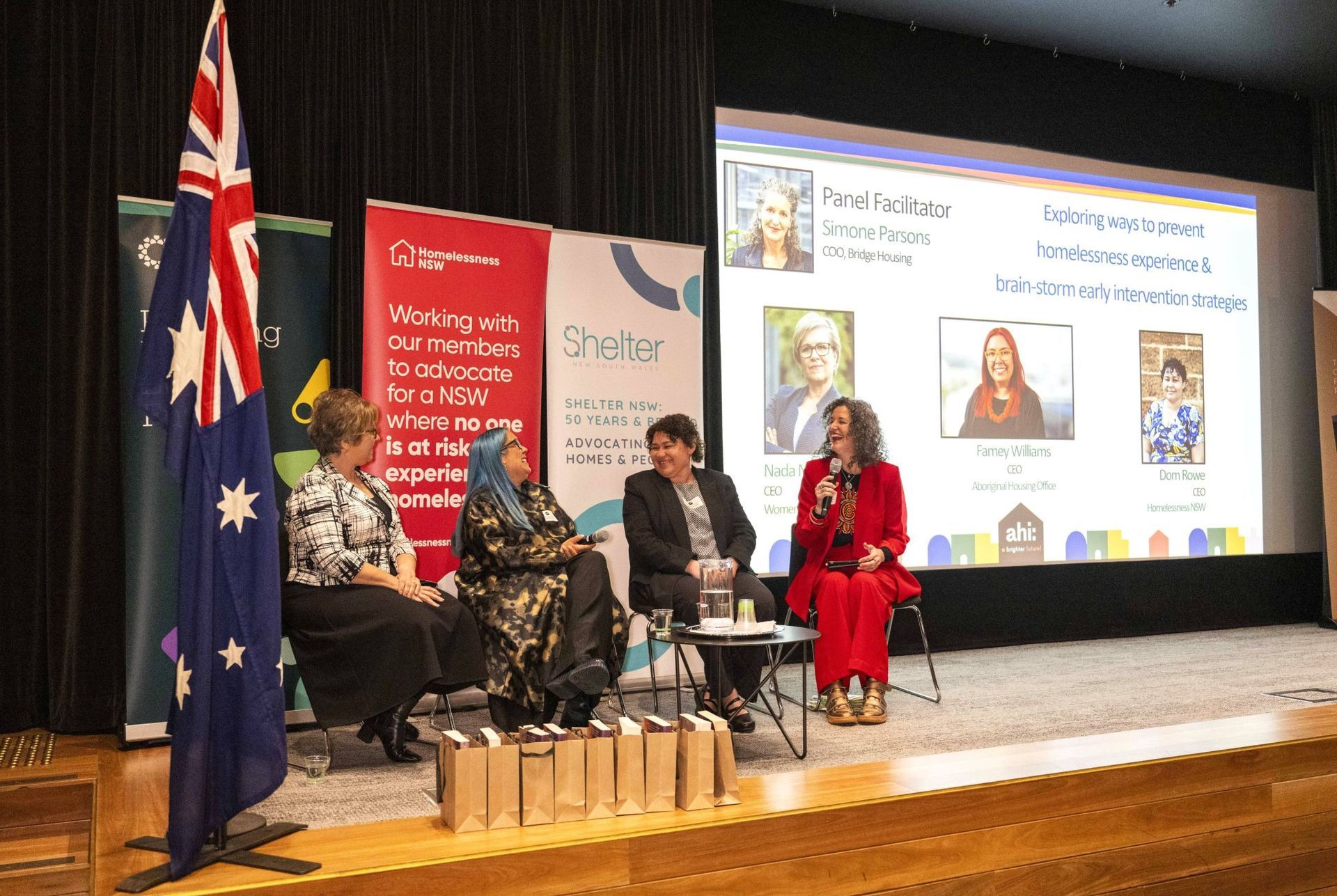There’s nothing like working in the social and affordable housing sector. It’s a worthy pursuit, and one that needs to be contextualised from the first day on the job. HousingWORKS speaks to some of the people behind the ahi: Social and Affordable Housing Induction workshop to discover how to set off on the right foot.
You’d be hard-pressed to find someone who has not experienced a forgettable induction to a new job or workplace at some point. Filling out a seemingly endless number of forms, an IT system that you can’t log into, security access cards or fobs that haven’t been activated… For some people, it ends up being overwhelming and, for those who just want to roll their sleeves up and get cracking, it’s frustrating.
Snippet from Kellie Dunn's introduction to the ahi: Induction workshop.
While it’s imperative any workplace takes care of the necessary ‘housekeeping’ required when welcoming new staff, very few inductions focus on contextualising your role within the industry in which you work. For the facilitators of the ahi: Social and Affordable Housing Industry Induction workshop - Unis Goh, ahi: Life Member; and Robert Macbeth, Head of Housing for Tauhara North No.2 Trust – context is everything.
The ahi: Social and Affordable Housing Industry Induction features content from industry experts so those taking part receive a range of insights on the roles they can play, the landscape in which they’ll be involved, and how they can navigate the housing sector and help make a difference in the lives of some truly vulnerable people.
Why an Australasian perspective matters
Snippet from Robert Macbeth's presentation in the ahi: Induction workshop.
Aotearoa New Zealand and Australia have a lot in common – geographically, culturally and historically. As Robert explains, those similarities extend to social and affordable housing.
“No matter which jurisdiction you're in – whether it's New South Wales, Victoria, or even New Zealand – we have some really interesting commonalities across the Tasman. It's really important to understand what those commonalities are, and what the history is.”
“When I run the course, I always do a bit of a poll to see where people are coming from. We get a few people that have been in the sector for quite a while, but we've got a lot of new people into the sector; people who are coming out of the real estate industry where they've been property managers and now they're coming into social housing, which is fantastic.”
“What I find is, as we go through the history [of social housing in Australia and New Zealand] people haven't cottoned on to the fact that most social housing is owned and operated by a government agency,” Robert continues. “Now that's strange in the rest of the world but, whether it’s an Australian state or in New Zealand, we share a uniqueness, and it's important to know that’s not the norm. It begs the question: Why did that happen?”
“People don't know this, but New Zealand was the first country in the world to start a government-owned public housing portfolio.”
“People don't know this, but New Zealand was the first country in the world, really, to start a government-owned public housing portfolio. In the ‘30s, the government response to the Depression was to start building state housing, whereas other countries largely started post-World War II. Even in the UK, council housing was really a post-war scenario.”
“And so,” says Robert, “you can answer that question by saying governments have found it necessary to intervene because the private market wasn't doing that job. Governments in the post-World War II environment built social housing because it wasn't being built by anybody else.”
The similarities of social and community housing in New Zealand and Australia extends well beyond its shared history. For Robert, it’s fundamental that housing professionals understand the industry landscape beyond their own turf. He’s adamant we encourage our social professionals to understand how to use legislation, and how to interpret it so that they can work across boundaries.
“If you compare Victoria to New Zealand, man, the similarities are very close.”
As Robert observes, “I've worked in Queensland, Victoria and New Zealand, and while there are different nuances, if you compare Victoria to New Zealand, man, the similarities are very close.”
He uses medicine as an interesting analogy to explain his point: “If you're trained and registered as a doctor in New South Wales, you can go to Victoria and work there; and you can come across to New Zealand and work in New Zealand because your training and registration as a doctor is what it's all about. But, when you get to the different jurisdictions, you've then got to understand how the different health systems work.”
“It's the same in the housing profession,” he continues. “If you've worked in tenancy management in New South Wales, you should – at an absolute minimum – be able to work as a tenancy manager in Victoria because you've been trained in what to look for. You should know how to find what the differences are, and where to go to look for them.”
He says that the experience and knowledge that can be shared between different organisations in terms of Indigenous housing has innumerable benefits too.
“Māori housing— is an area that I'm particularly focused on, and there's a lot of learnings in the Māori housing space that could equally apply to Indigenous communities in Australia. We can share information, we can create networks of people who are in the same sort of space, and we share their experiences.”
“If we don't understand how we work, how the hell are we going to improve or change?”
“I think as professionals we're better together on both sides [of the Tasman] because, at the end of the day, we are one large island and a group of smaller islands at the bottom end of the world with shared history, and shared culture, and a shared evolution of our housing markets that looks very different to the rest of the world. If we don't understand how we work, how the hell are we going to improve or change?”
The importance of customer service in social and affordable housing
Snippet from Unis Goh's presentation in the ahi: Induction workshop.
For Unis Goh, understanding customer service is the foundation stone of personal and professional development in what is a people-focused industry. If you’re in any doubt about this, she cites the example of Mike Allen, the former CEO of Housing NSW, and the Chair of the Link Wentworth Housing Board, who she sees as embodying 'a customer service perspective'.
“Mike Allen started in the industry, I think, at 16 years of age as a clerk and progressed all the way to the top,” Unis begins. “He’s so highly respected in the not-for-profit and government sectors. Often, governments defer to him asking for his opinion. Now, he is the chair of the Board of Link Wentworth, one of the largest innovative housing providers in New South Wales.”
For Unis, customer service in housing is very different to hospitality or retail. Her firm belief is that a good customer experience is about walking the journey with your tenants.
“You walk the journey with them. If you do that well, everything follows.”
“Housing services are really housing systems – having properties, allocating housing units to people – and that means you have to focus on the quality and the standard of your service,” she says. “When tenants start to feel good from finding reliable housing – when they gain in confidence – it’s empowering, enabling. Putting a roof over somebody's head and giving them a key to their home gives them a sense of belonging, and that’s crucial. They can see a future. They can start piecing pieces together. You walk the journey with them. If you do that well, everything follows. That's why I think it’s so important.”
With a career in housing spanning multiple decades, Unis is also well placed to argue customer service’s role in continuous improvement at an individual level.
“You have to have a strong sense of learning,” she says. “If you don't learn, you stall, you go backwards — especially in this day and age with artificial intelligence and all those technologies coming on. As a housing worker, I’m continuously looking at ways and means of improving my knowledge and polishing my skills and questioning to my peers: Am I right? My thinking was this, am I right? This is how I handle this."
This commitment to continuous improvement also extends to the broader industry: “I think it’s so important — and this is why the ahi: has modified the way we deliver training programs to people in the housing profession. We used to run only face-to-face but, with COVID, we adapted and adjusted, and we're doing online courses and webinars.”
She’s passionate that industry professionals do some sort of continuous improvement work at least once a year: “Attend something —a seminar, a conference. Book yourself in and then you've got to do it [she laughs]. You don't need your boss to tell you it's time for you to do some training – you make the choices yourself.”
“Continuous training and elevating your professional standards is the hallmark of working in the social and affordable housing sector. That's what makes us different.”
“Sometimes, I will say to people, go and do something totally different – totally different from your workplace – and they'll be surprised and get those ‘aha!’ moments,” Unis says. “Continuous training and elevating your professional standards is the hallmark of working in the social and affordable housing sector. That's what makes us different from real estate agents.”
“The career opportunities are limitless for workers,” she wraps up. “You can be a frontline receptionist, answering the phone. You can be assessing applicants and their needs. You can be the allocation officer looking at matching properties with the list of applicants. You can be the tenancy manager helping people to settle in and resolving problems with them in their tenancy period. You can be in asset management. You can be a handyman, a plumber, an electrician, an asset manager… There are so many, many different jobs.”
The ahi: Social and Affordable Housing Induction runs regularly throughout the year.
Book into an upcoming workshop.
Share This Article
Other articles you may like






